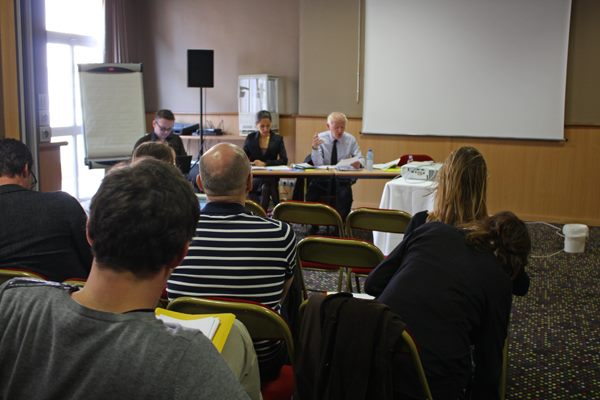Colloque et conférence
La dynamique des relations entre le Royaume-Uni et l’Union européenne ne peut être appréhendée dans sa totalité et dans sa spécificité sans prendre en compte le rôle déterminant qu’y jouent les Etats-Unis, à travers notamment les relations que Londres voudrait croire « spéciales ». Que ce soit de manière directe, indirecte, voire parfois paradoxale, le tropisme américain/atlantiste de l’establishment politico-médiatique britannique est en arrière-fond d’une bonne partie de leurs positions considérées comme sceptiques, ou même carrément hostiles envers de la construction européenne.
On examinera d’abord la matrice de ce ménage à trois, telle qu’elle se manifeste à travers d’éclatantes illustrations concrètes, en particulier dans le domaine de la défense/sécurité. Après un bref rappel introductif des origines de ce « trouple », on avancera l’hypothèse – immédiatement appuyée par les premiers exemples au choix – que la coopération UK-USA et la coopération européenne sont uniquement réconciliables sur des dossiers secondaires, mais restent mutuellement exclusives dès que l’on touche aux sujets les plus sensibles du point de vue stratégique.

Dans un deuxième temps, on énumèrera une série de fiascos et de désenchantements dans la coopération entre le Royaume-Uni et les Etats-Unis, lesquels sont comme autant de témoignages que la priorité transatlantique persistante de Londres est moins motivée par le proverbial pragmatisme britannique que par ce qui ressemble plus à un pari, voire un acte de foi. S’en suivront, comme en contrepoint, les exemples où Londres, par crainte de froisser Washington, ne cesse de bloquer, détourner, affaiblir les initiatives européennes, auxquelles le Royaume-Uni aurait pourtant infiniment plus de chance de participer sur un pied d’égalité, sur la base de ses propres intérêts, en faisant effectivement entendre sa voix.
En troisième partie, on nuancera le tableau en y introduisant trois remarques. Premièrement, le Royaume-Uni est loin d’être le seul à professer, à l’intérieur de l’UE, un atlantisme sans faille. Il a néanmoins des spécificités (langue, statut, conceptualisation etc.) qui le distinguent des autres, et font de lui à la fois un chef de file et un cas à part. Deuxièmement, il existe des exceptions notables au choix du tout-Américain, au profit notamment de solutions européennes, mais elles provoquent chaque fois un tel tollé, qu’elles s’accompagnent d’excuses et sont souvent suivies soit par des rétractions soit par des décisions compensatoires. Troisièmement, des voix isolées, mais non des moindres (venant de hauts responsables politiques, militaires et du renseignement), s’élèvent à intervalles réguliers contre ce qu’elles décrivent comme une déférence excessive vis-à-vis de l’Amérique, mettant en péril la souveraineté nationale. Si elles restent comme étouffées, ce n’est qu’en partie dû à la puissance de la pensée unique environnante, c’est aussi parce que l’alternative européenne semble, pour des raisons de plus en plus structurelles, de moins en moins faisable.

 |
Toulon eurobrit 2013.pdf |
Tags:
royaume-uni






















